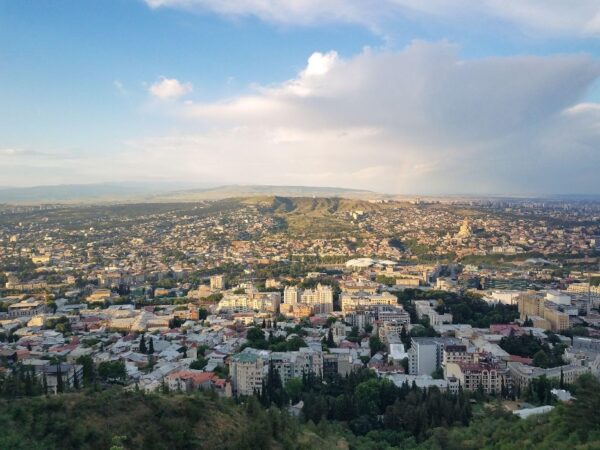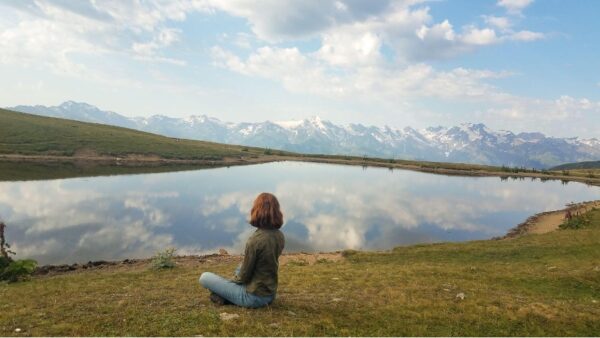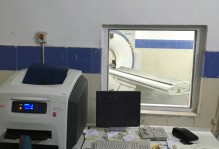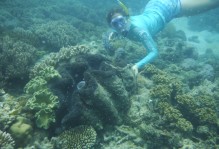Meeting the Friends I Didn’t Know We Had: Interviews with Georgian Veterans
By Maia Earl ’22
The Global Research Institute’s Summer Fellows Program provides international experiential learning opportunities to W&M students. This post is one installment of a series highlighting the 2022 Fellows’ key discoveries and formative experiences.
My plan to join Professor Daniel Maliniak’s research team in Georgia came together late in the spring semester as I was finishing up my Middle Eastern Studies capstone project. I had little time to read up on this country in Eastern Europe that I knew next to nothing about. I felt unprepared, but it made the adventure all the more exciting. My time in Georgia turned out to be an incredible experience of personal growth and learning.
Upon arriving in Tbilisi in early June, I was quickly caught up to speed by Professor Maliniak and four other William & Mary students who were already in-country. While still recovering from jet lag, and less than 36 hours after landing, I found myself trekking across the city with the professor and fellow student-veteran Chuck Williamson for a highly-anticipated interview with a Georgian veteran. As we passed historical monuments on Rustaveli Avenue and crossed under streets through tunnels lined with clothing and jewelry vendors, I listened intently to Professor Maliniak’s off-the-cuff history lesson on what Georgia has toiled through since its break from the Soviet Union. It was an exciting place to be, and I felt like a character in the The Adventures of Tintin.

Overlooking Tbilisi in the late afternoon from a hiking trail on the outskirts of the city. The Holy Trinity Cathedral can be seen in the upper-right portion of the frame.
I liken my experience in Georgia to learning a foreign language by immersion rather than by classroom lessons. Although I had little prior knowledge of Soviet history and post-Soviet states, interacting closely with Georgians and later being invited into their homes gave me a different, more intimate kind of understanding of Georgian culture and society. I learned, by doing, what it is like to live in a country that is only three decades out from gaining its independence from the Soviet Union. Shopping at local markets, using public transportation, and seeing up close how families struggled with economic conditions all helped shape my understanding of Georgia. At the same time, the research itself developed my knowledge base of Georgia’s recent history with a focus on politics and security.
The primary objective of our field research was to hear from Georgian military veterans on their reasons for participating in international missions in Iraq (Operation Iraqi Freedom) from 2004 to 2008 and in Afghanistan (the International Security Assistance Force and Resolute Support Mission) from 2010 to 2021. We ended up interviewing both active duty soldiers and veterans, as well as former diplomats, defense officials, and think-tank professionals, and the conversations we had were eye-opening and extremely gratifying.
One of the things that struck me the most about our interviews with Georgian military personnel was how much it meant to some of them to talk about their experiences. When I first arrived, I was not sure how the conversations with Georgian veterans would flow. Not only were they willing and even happy to provide an interview, but speaking with us turned out to be a cathartic experience for some of them. I think this came as a pleasant surprise to both parties. I was personally moved and honored by the amount of trust they placed in me as a stranger sitting down with them for the first time. Perhaps they found themselves able to express things about their careers and their experiences that they had not previously been able to. Or perhaps it was the fact that they were speaking with American researchers (and in my case, an American military veteran) who were genuinely interested in hearing about their service in Iraq and Afghanistan — a story that some Georgians fear has been all but forgotten by their Western partners.

A moment of reflection in Svaneti, a mountainous region in northern Georgia.
On the question of why the Georgian Defense Forces (GDF) served in Iraq and Afghanistan, we found there to be three primary motivations. On the level of the individual, and particularly for the junior-level soldiers, a large motivating factor was their need to support their families economically. Deploying in support of these international missions was one way for soldiers to increase their income and thus to support their loved ones. This motivator often overlapped with one or two other goals which reflected Georgia’s broader interests: to gain professional military experience and to further Georgia’s integration with the West. Deploying, especially to Afghanistan where the GDF participated in full-spectrum operations, presented an unparalleled opportunity to gain professional experience in combat and counter-insurgency operations. It was an opportunity to work side-by-side with American and NATO troops and to put theory into practice, solidifying and expanding what they had learned in training. Their performance in these missions, marked by courage, bravery, and reliability, earned the respect of their Western counterparts and in turn, contributed to a greater international presence for Georgia.
While the GDF were largely successful in achieving these goals, one elephant in the room remains: Georgia’s accession to NATO. In putting their lives on the line in these conflicts, Georgian forces were showing their commitment to what they see as their Western family and its democratic ideals. As many of them shared with our team, they were demonstrating that Georgia is a good and reliable partner. And small countries like Georgia depend on good foreign relations with strategic partners, so they might continue to maintain their national sovereignty and rich cultural heritage. The barriers to NATO membership, as well as the goals of U.S.-Georgian security cooperation and the challenges that the GDF face are subjects that warrant further research.
My memories from my time in Georgia will stay with me forever. In addition to participating in a fascinating research project with a wonderful team, I developed a few close friendships and experienced the generous hospitality of a rural Georgian family. I had the chance to explore the stunning Caucasus mountains in Svaneti and Kazbegi and visited many historical sites such as the Jvari Monastery in Mtskheta, Georgia’s former capital city. I plan to continue contributing to Professor Maliniak’s research in the future and to develop an additional avenue of research on the GDF and U.S.-Georgian security cooperation.




No comments.
Comments are currently closed. Comments are closed on all posts older than one year, and for those in our archive.